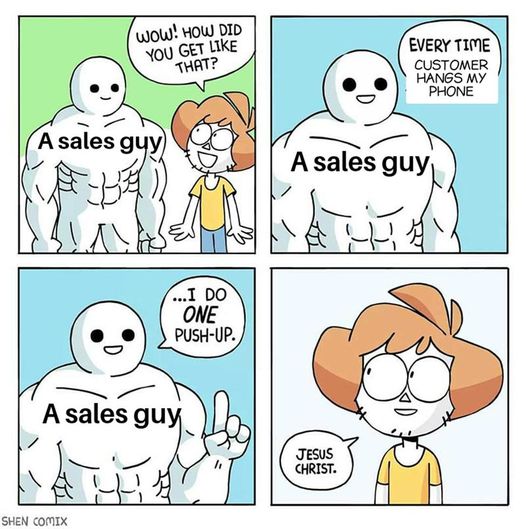You’ve probably heard me mention on more than one occasion how important sales are to a business’s survival and growth.
There are tons of people I meet who need help with this.
Looking at what’s out there, I can understand why—”business gurus” complicate the process by introducing so many tactics and methods that really aren’t necessary.
The truth is, selling is simple and focusing on it is the quickest way to turn your business around.
It’s all about taking emotion out of the picture and just focusing on the fundamentals.
And I’m going to tell you exactly what those are here.
To start, I want to stress that selling is not about convincing anyone to buy something they don’t need or want—and can’t benefit from having.
Those old-school high-pressure car salesmen have done enough in giving sales a bad reputation.
Selling is actually about educating your prospect on how what you have will make their life better.
So, the purpose of engaging in a sales conversation is to see if what you have can HELP them—you getting paid is just a consequence.
Creating this sort of a WIN-WIN situation is how sales superstars hit their quotas.
To actually do this, you only need to do a few things.
- Lead the conversation and display your expertise. You have to know what you’re talking about. You must be an authority on what you have, and they must like you for it.
- You have to build trust. If you don’t show that you understand your client’s pain points and that you’re not trying to rob them of their hard-earned money, they’re not going to trust you have what will help them.
- In your pitch, you must sell the BENEFITS—not the features.. People don’t buy into features, they buy into results. They have to have their mind’s eye on an image of their life improving WITH your product/service.
The psychology behind this: Features appeal to logic. Benefits appeal to emotion. People take action based on emotion, THEN they logically rationalize the decision they made.
- You have to ask for the sale. This one’s kind of a no-brainer, but it’s often missed. Rookie salespeople often feel uncomfortable asking for the sale. They assume people will just ask to buy. And, they sometimes will, but why risk it? Remember the first point? Lead the conversation and display your expertise.
- Handle the objections that come up by addressing them and asking questions. Because we all have fears and limiting beliefs, you may get declined with what’s called an “objection”. If you’ve determined what you have can actually benefit them, and they’ve acknowledged that throughout the conversation, the objection is a smoke screen. Dig deeper, and then ask for the sale again.
- Follow up!!! Your job isn’t done when you’ve made the sale. Your job is done when your customer is happy and you’ve ensured what you’ve given them is actually making their life better. Unless you complete this essential step, you’ll likely miss out on repeat customers and referrals. Follow up with every single sale you make.
That’s all there is to it. Anything extra just complicates the process. Keep it simple. Keep it casual. And most importantly, keep it moving forward. If you’ve proven what you have works, there’s someone out there that’ll buy.
